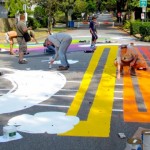 The last few years have seen a big growth in attempts by governments to better engage with citizens on a whole range of matters, whether it’s looking for ideas (as Obama and the Labour party have), participatory budgeting or even civic co-creation, there are no shortage of attempts to tap into the power of the crowd.
The last few years have seen a big growth in attempts by governments to better engage with citizens on a whole range of matters, whether it’s looking for ideas (as Obama and the Labour party have), participatory budgeting or even civic co-creation, there are no shortage of attempts to tap into the power of the crowd.
Indeed, innovation charity NESTA predicted that 2014 would be the year when politics became crowdsourced, with the likes of IBM and Deloitte all producing reports on the topic.
Indeed, Forrester suggested that government will eventually be fixed from the outside in, as the crowd take greater involvement in the delivery of services.
Boosting civic engagement
Alas, a recent study showed how few crowdsourcing ventures actually work, so there is certainly no guarantee that opening up processes to the crowd will deliver results.
CitizenLab hope to rectify that by bringing the town meeting into the digital age. The tool provides citizens with a secure and easy to use space through which they can communicate with their government.
Participants locate their city, under which a range of ‘labs’ will be offered on a number of topics. Within each lab, citizens can join existing conversations or start their own.
The hope is that local governments will use the space to gain a better insight into the desires and challenges of citizens so that they can better service those needs.
The tool is currently in Beta testing and is looking for participants to test the system out.
Suffice to say, this isn’t the first, or only such platform in operation, and the study referenced earlier underlines the challenges involved in securing involvement by citizens in such community platforms.
So whilst it’s undoubtedly good that there are more tools for governments to begin engaging with citizens, the jury remains out as to whether we’re seeing a fundamental change in how services are supplied.
Interesting stuff, although I do wonder if people really want to get involved or they just want to consume what they're given. We've got busy lives after all.
I suppose that's always the risk with trying to co-create anything. Who will the participants be and how diverse a representation of your audience will they represent?
Hi Paul and Adi,
I am the founder of CitizenLab. @Adi, thanks a lot for writing an article on CitizenLab and civic co-creation.
I think it's indeed the biggest challenge that you're putting forward, Paul. We wouldn't have started this project without having thought about that. Through a citizen-centric design and gamification, we believe that we can maximise online citizen engagement. With a citizen-centric design, I'm referring to an app that makes it easy to navigate through the ideas, intelligent user onboarding, a fresh design and context awareness on mobile (i.e. we'll strengthen the conversation between citizens and city by pushing the right ideas to the right citizens based on context parameters (such as location)).
I agree that the vast majority of the citizens won't engage if there's nothing in for them. That's why we make use of gamification in order to incentivise the citizens. Every time their posts or comments get upvoted, they will earn points (resulting in new badges) and will move up in the citizen leaderboard. The city will reward the most engaged citizens in its turn.
Through an intelligent user experience, we believe that we'll be able to drive up the civic engagement. Would love to hear your thoughts on that.
Cheers,
Wietse
Hi Wietse and thanks for stopping by. How have results been in the places you've tried your approach out in thus far?
We're ready to start running pilot projects now. Hopefully we can draw some first conclusions by the end of the year. If you'd know any cities that might be interested in setting up a pilot project together, please let us know.